Mobilized: Serbian Protestors on the March💪
On events in Serbia and what the nation's protestors are demanding 🇷🇸
Concretely Tragic
If you follow international news, you’ve likely seen that Serbia is now home to the largest student-led protests in Europe since 1968. US and EU officials have remained mum on the matter, which is not surprising considering Serbian demonstrators challenge the interests of those residing in the American and European halls of power. These protests are the product of an ongoing battle over utilization of the country’s mineral assets, as well as anger over general corruption that was highlighted by a tragic accident last fall.
On November 1st, the canopy over the entrance to the Novi Sad train station collapsed, killing 15 people and leaving 3 survivors with life-altering injuries. Amongst those 15 victims were 4 children, young people whose likenesses appeared across media platforms in the days following the tragedy. November 2nd was declared a national day of mourning, while the city of Novi Sad (plus the whole province of Vojvodina) committed to three days of public grieving. Rage followed grief as citizen-led protests erupted in Novi Sad and spread to cities across the country. Demonstrators demanded that the catastrophe be investigated thoroughly and impartially. In a small country, every life matters and people are vested in the safety of their compatriots.
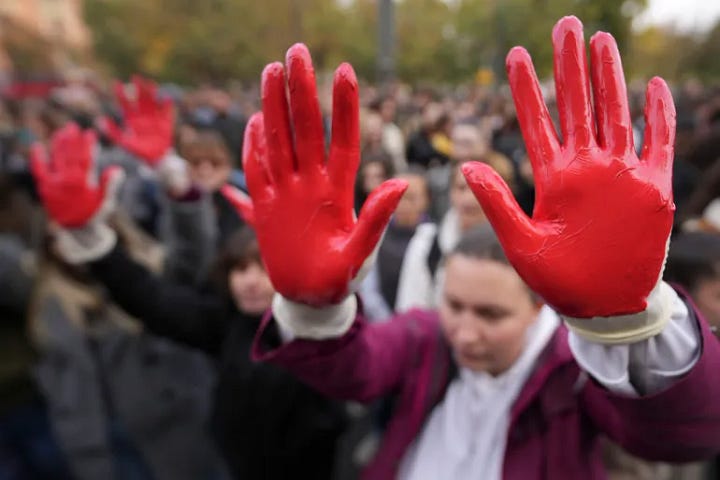
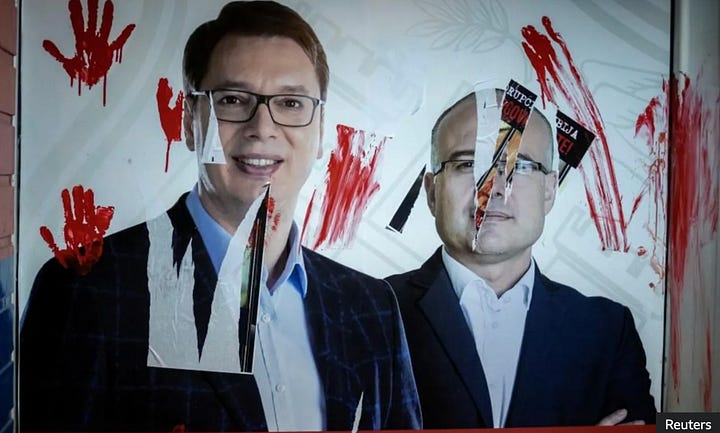
Novi Sad’s train station was built in 1964, and underwent €16 million worth of renovations between 2021 and 2024. Novi Sad is Serbia’s second most populous city, a connection point between the Hungarian capital Budapest and the Serbian capital Belgrade. The city boasts a growing IT sector, a large university, numerous cultural heritage sites, and since it straddles the Danube River, it remains an important port of call for cruise ships and cargo vessels connecting Central Europe to the Black Sea. Like the rest of the country, Novi Sad is enjoying an infrastructure boom, and its train station and rail lines were long overdue for an overhaul. Yet when the canopy collapsed in the middle of a busy afternoon, residents were forced to contend with major questions about the integrity of their city’s revamp. As protests following the catastrophe grew, protestors explicitly demanded the release of all documents pertaining to the contracts involved in building; forensic investigations of the physical structures that were renovated; and prosecution of any officials found to have cut corners that compromised the physical integrity of the structure.
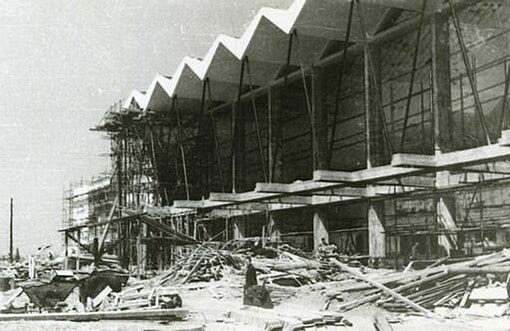

Mineral Impact
As mourning marchers convened to honor the victims of the canopy collapse, an ongoing political sore festered in the foreground. Anglo-Australian mining corporation Rio Tinto has been pushing the Serbian government to expand mining operations since ample mineral reserves were discovered in 2004. As Rio Tinto accelerated its lobbying, public pushback grew as political players in the country maneuvered deals in favor of the mining giant.

In July of 2024, Serbia’s government gave Rio Tinto the green light for Project Jadar, a plan worth an estimated $2.7 billion. The nation’s constitutional court backed this go-ahead the following month, flipping a prior 2022 mining moratorium on its head. The “Jadar” project is named for jadarite, a mineral containing a combination of boron and lithium. Citizens from across the political spectrum feared nationwide water contamination from planned excavations in both the western and eastern mountainous regions of the country. After Serbian President Aleksandar Vučić defeated a motion in parliament to prohibit lithium exploration nationally in October 2024, protests against the government’s submission to Rio Tinto escalated with political corruption becoming the primary target.
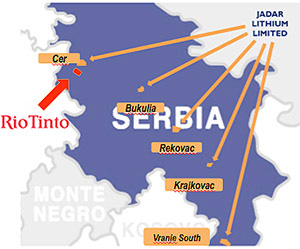

Thus, a national tragedy coincided with an ongoing national controversy fueling an expansive movement of protests across Serbia, building off anger fomented over the past half a decade.
2019-2023
Marches and demonstrations against the Serbian government’s relationship with Rio Tinto spread across the country
2020: community organizers in the Podrinje district raise the alarm on water rights and water contamination that could result from Rio Tinto’s planned mining projects in western Serbia
2021: Draft plan of Project Jadar released by activists and subsequent ads by Rio Tinto criticized for violating laws pertaining to public advertisements of corporate interests.
Activists want the Law on Advertisements to be applied to prevent private companies from using public airways to disseminate unverified and/or biased statements.
Nov 2021: protests against eminent domain laws that allow private property to be seized and given to private companies if it is deemed to be “in the public interest”
Activists want the Expropriation Law and Law on Referendum and People's Initiative to be applied ONLY in cases where the public interest is at stake, and NOT the interest of private entities
Dec 2021: protestors march against proposed lithium mine in the Morava Valley
2022: further protests against Rio Tinto activities in major cities; protestors in Loznica (Podrinje district) target Rio Tinto information center
Activist groups like Ecology Uprising demand all documents related to Rio Tinto’s actions and plans be made public; principle that private companies looking to operate in Serbia need to make all plans and procedures available to the public
2023: Protests against Rio Tinto continue, along with demonstrations focused on the needs of Serbia’s farmers, pensioners, and students
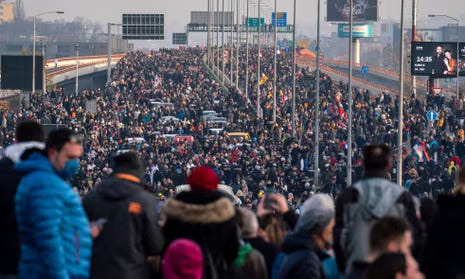

Blocking roads and taking over the capital over the Serbian government's relationship with mining giant Rio Tinto 2024
Anger of Rio Tinto’s relationship with the Serbian government remains ongoing
June 2024: Environmental group Ne damo Jadar organizes farmers and citizens, publishes statements on mining’s environmental impact
Serbian opposition parties condemn Germany’s pro-mining stance; accuse Germany, the US, and the EU of bullying Serbia to mine lithium for their own economic benefit at Serbia’s environmental expense
Jul-Aug: demonstrations against Serbia’s presidential and judicial favoritism towards Rio Tinto
October: President Vučić’s defeat of an anti-mining parliamentary decision provokes anger, allegations of corruption and presidential power abuse
01-Nov: canopy collapses in front of the Novi Sad train station, killing 14 on impact; one patient dies in hospital, and three more are critically injured
02-Nov: National day of mourning for the victims and survivors of the Novi Sad train station canopy collapse
November 2024: up to 20K protestors march in the city, demonstrating in front of the city hall and in front of the Serbian Progressive Party (SNS) headquarters
Transport Minister Goran Vesić resigns
Some protestors blockade traffic and motorists believed to be affiliated with the SNS party struck some demonstrators
01-Dec: silent protest in Novi Sad
President Vučić refuses to arrest driver who hit demonstrators in Novi Sad
06- Dec: members of the Belgrade Philharmonic are injured by a car while protesting
11-Dec: President Vučić pledges to release all documents related to the canopy reconstruction and collapse investigation, but refuses to resign from the presidency (as many demonstrators are demanding he do)
December 2024: 50 university campuses become the sites of protests; farmers organize protests on 13-Dec; postal worker marches begin on 25-Dec; veterans declare protests on 29-Dec; support from artists, athletes, and entertainers pledged. Protestors have been arrested, suspicious attacks on demonstrators have occurred, and protests continue to spread across major cities.
Public outraged when the prime minister publicly stated "You can't bring down a country because of 15 people who died, nor 155, nor 1,555."
29: Dec: military veterans’ associations joint protest movement
Protest numbers in the capital of Belgrade reach 100K
2025
12-Jan: education workers strike in support of protest movement
18-Jan: Serbian bar association announces 7-day strike
21-Jan: employees of the state electric company Elektroprivreda Srbije pledge support to protestors and strike
25-Jan: general strike of students and workers goes off across the country
28-Jan: Prime Minister Milos Vucević resigns (his comment back the previous month made him an object of particular scorn)
February 2025: pensioners and taxi drivers support demonstrations and strike
Growth and Grievances
Serbia’s economy is growing fast and diversifying with great emphases on transportation infrastructure and natural resource extraction. Back in 2013, China announced its Belt and Road Initiative, so Chinese, Hungarian, and Serbian officials convened to discuss plans to revamp the road and rail lines connecting Budapest-Novi Sad-Belgrade, with the long term goal of creating a network that connects Budapest to Athens via Novi Sad, Belgrade, and Skopje.

The segment of high speed railway connecting Novi Sad to Belgrade that opened on 20-March, 2022 were part and parcel of this initiative, as were the major renovations to Novi Sad’s central rail station. While much of the monies for these piece projects under the umbrella of the Belt and Road Initiative came from China, Egis, a French-origin engineering corporation, led the team of firms that carried out the railway station redo. Protestors want to ensure that these corporations, along with the Serbian state-run entities tasked with oversight of the construction and its subsequent operations, be held to account.
While there was a great deal of national pride in the rapid expansion of high-speed rail connecting Serbia to Central Europe and the Mediterranean, the canopy collapse marred this project’s benefit and pushed questions about the integrity of the contractors involved to the forefront. February 1st marked the three-month anniversary of the canopy collapse, and Novi Sad was once again enveloped in protests.
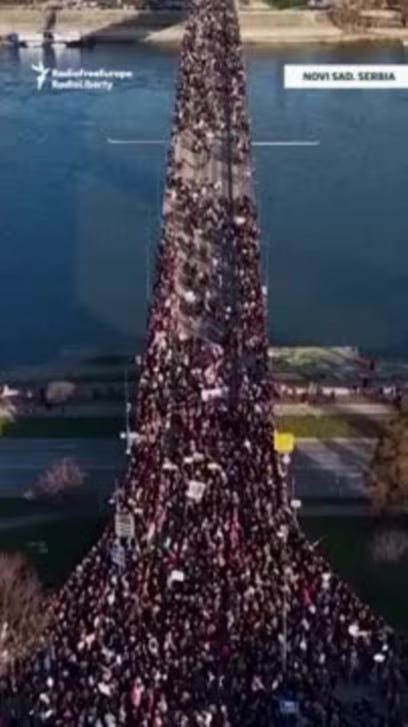

On the mining front, Rio Tinto is a major player in the global natural resources sector, and has lobbied persistently for access to Serbian mineral wealth, despite citizens’ objections. The political left in Serbia has opposed Project Jadar for environmental reasons, while more conservative factions view it as a gateway to forfeiting the country’s natural resources to a western power. Pro-mining factions in Serbia’s government hoped to become a major supplier of minerals to the European Union, prickling liberal and conservative consciences for similar reasons: potentially polluted water and undue influence from a multinational corporation with ties more affluent nations that have a track record for abusing access to the developing world’s natural resources.
Developing countries along with vulnerable communities within developed nations often bear the brunt of environmental degradation. Rio Tinto has a track record of irresponsible mining practices on its home turf in Australia, where extraction operations destroyed sacred Aboriginal sites, causing cultural harm on top of ecological wreckage. In America’s Southwest, Rio Tinto and the Trump administration are pushing for copper mining in Arizona, but the local San Carlos Apache Nation fear adverse impact on their ancestral lands. Residents living downstream from Papua New Guinea’s old Panguna gold and copper mine suffer from air particle and water pollution thanks to mining waste dating back to the 1970s. Reports from the island nation of Madagascar reveal high levels of lead toxicity amongst people living in the vicinity of a Rio Tinto subsidiary operation, while local fisheries tanked due to residual mine contamination. So, it is no wonder that people in Serbia are loathe to put themselves and their lands in the danger zone in exchange for business deals more likely to bring poison than general prosperity.

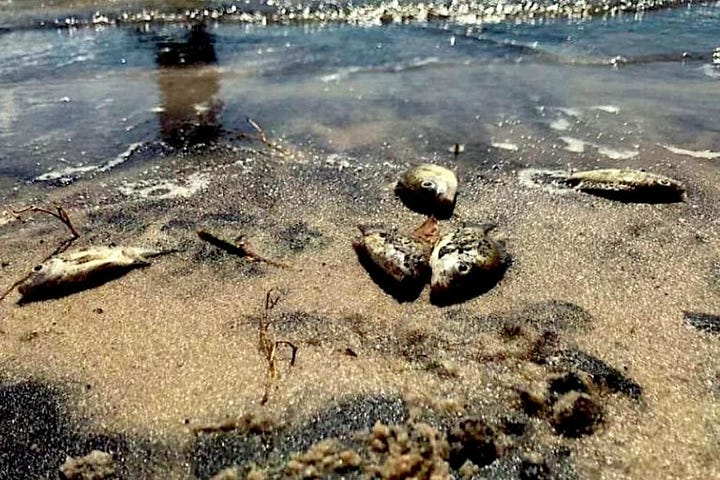
Those marching with goodwill have every right to hold domestic political leaders and the multinational corporate class accountable. Laws that privilege eminent domain over citizens’ property rights; deals made with minimal transparency that give power to foreign corporations; and government contracts given for renovations that yield deadly results all threaten the integrity of a democracy. Serbia’s people are standing up for themselves, their country, and their country’s future as a sovereign nation in an increasingly multipolar world.




Bravo to the people of Serbia, especially the students, whose American counterparts are called idiots, losers, flunkies and much worse names for protesting peacefully on campus against the genocide, even thought many of the protesters were anti Zionist Jews. Serbia has every right to clean air, clean water and clean lands just like the billionaires in rich countries do.
Rio Tinto should have gone out of business for its outrageous track record environmental catastrophes and destructive behavior. This company owned completely by the Rothschild Zionists in the better part of the 20th century was shown to perform egregious acts of dumping and polluting rivers all over the world but especially in Africa. The Rothschilds begrudgingly relinquished their stake in the company, which continued to follow abusive practices world wide. The British, Australian and American governments are invested in this company as a national security concern and support and protect Rio Tinto based on this preposition. Serbia should have never even had talks with this corrupt and corrupting corporation which couldn’t care less about the people of Serbia.
As for demonstrations, I’m always hesitant to support any anti government demonstrations in non NATO, non EU countries if there is any hint of CIA meddling. I have no doubt that these demonstrations are far from that. Bravo people of Serbia 🇷🇸 (srpski narod) ?
Thank you for writing such a clear and informative article about the situation in Serbia.